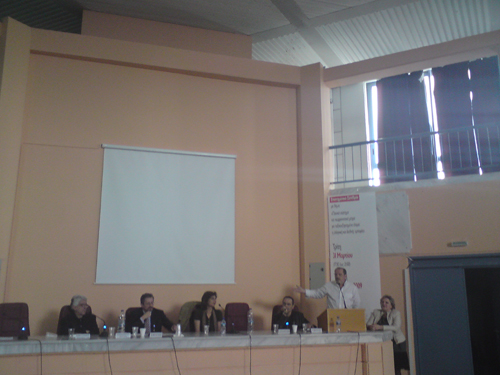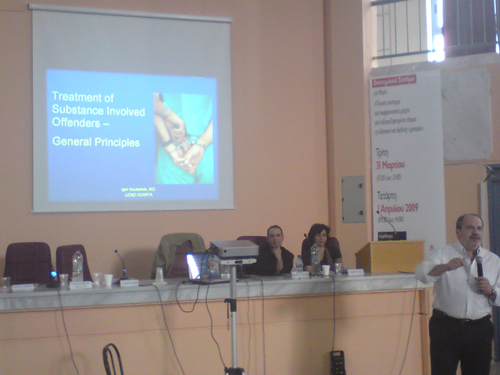by Manos Tehnitis,
Student of Law at the Aristotle University of Thessaloniki
The Therapy Center for Dependent Individuals (KETHEA)* in collaboration with the Faculty of Law of the Democritus University of Thrace, organized a two day scientific conference on the "Penal system and correctional measures for drug addicts. The Greek and international experience.” The workshop was held at the University of Thrace, on March 31st and April 1st, 2009.

The aim of the Congress was to overturn perceptions of drug addicts as offenders and to exchange scientific views on the most appropriate and effective correctional treatments. The interdisciplinary discussion was attended by an audience of law students, doctors, lawyers, judges, psychologists and journalists.
The speakers began following a brief greeting and introductory speech by the chair. Mr. Kosmatos, special scientist of Law, Democritus University of Thrace, analyzed the status of drug addicts in the legislation on drugs, highlighting the current ineffectiveness of the law and the need to change attitude within the state. To illustrate his recommendations, he distributed copies of law 3459/2006 regarding drugs. The following speaker, Mr. F. Kaloterakis, BRE, MWS, special assistant director of KETHEA, referred to the drug problem inside Greek prisons, the actions taken by KETHEA from within the penal system, and the cost-effectiveness of these programs.

Mr.
I. Ilias, Doctor of Law at the Democritus University of Thessaloniki, reiterated the problems of drug-enforcement legislation regarding legal goods and suggested solutions for better correctional treatment for addicts. Mr.
George Notaras, sociologist and chairman of KETHEA. Mr Notaras gave an enlightening account "from the inside," describing the types of drug dependence, and the partial solutions made by the state. He then described some truly effective methods, and highlighted the achievements of KETHEA, and accused government justice ministers for apathy.
In the dialogue that followed, the first speaker was Mr. S. Pavlou, professor of criminal law at the Democritus University of Thrace and Vice Chairman of the Legal Faculty. Mr. Pavlou disagreed with several points made by Mr. Kosmatos, arguing that there is no special penal institution for drugs offences; instead the penalties are categorized according to the number of years of sentence. The next speaker was Mr. T. Dalakouras, professor of criminal law at the Democritus University of Thrace, who spoke about the procedures for reviewing drug addictions, which despite being mandated is not applied, due to lack of suitable facilities. The last testimonial came from Professor of Forensic Medicine and Toxicology, at the Democritus University of Thrace, Mr. D. Psaroulis, who explained the biological effects of drugs on the human body, and the degree to which they can be monitored. Finally, he made a reference to the problems of expertise mentioned by Mr. Dalakouras, noting: “the methodology is in place, the laboratories are in place, but the money is lacking."

The first speaker of the second session was Mr.
Paraskevopoulos, who referred to detoxification as a means of crime prevention. He was followed by Mr.
C. Dimopoulos, Professor of Criminology at the Democritus University of Thrace. Mr Dimopoulos explained the nature of drug prohibition and its social ramifications. Ms.
T. Tzannetaki, Assistant Professor at the Kapodistrian University of Athens (Law School) and member of the Board of Directors of KETHEA, followed with comments on the three types of penal sentence, emphasized their inappropriateness regarding the problem of drugs, and suggested ways of solving them. This was followed by Mr.
C. Vettas, special advisor on drug addiction, and principle of the Thessaloniki Prisoners Advisory Unit of KE.TH.E.A., who presented compelling evidence of the widespread use of drugs in prisons, and explained the modus operandi of KE.TH.EA within the prisons. The public were treated to the final speaker, Mr.
I. Koutsenok, professor of psychiatry in the field of drug addiction at the University of California, San Diego. The topic of his presentation was the basic principles of treatment in the prison system and the interesting way they are applied in the U.S.
The last presentation was followed by discussion and questions to which the speakers willingly responded. The debate was joined by Mr.A. Charalabakis, professor of Criminal Law and Director of the Criminal Law and Criminal Sciences of Thrace, who summarized the conclusions of the conference. Undoubtedly, the Congress informed, and prompted food for thought for all participants, resulting in the conversation continued outside in the hallways for some time. Warm congratulations go to the organizers and contributors for their excellent work.
*KETHEA (acronym for Therapy Center for Dependent Individuals) is a non-profit, non-governmental organization that has been operating since 1983, when ITHAKI, the first Greek therapeutic community for drug addicts was established.
On a daily basis, KETHEA offers its services to more than 3.000 persons (addicts and family members), thanks to a nation-wide network of services, which includes more than 90 units.
KETHEA is also active in the fields of primary prevention, education and research. KETHEA has special consultative status with the UN Economic and Social Council (ECOSOC) and is one of the principal organizations to implement the National Action Plan on Drugs. For more details see at the website
www.kethea.gr





